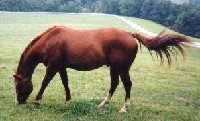 |
Joe was my first working cow horse and he was awesome. I sold him when he was 22 and every time I saddle up to work cattle I think about how much I miss him. One of my fondest memories was returning home to a message on the answering machine that my bull was out with a neighbor’s cows.
I rode the 640-acre pasture, sorted the bull from 150 cow/calf pairs and drove him a half-mile home within 45 minutes. Riding a horse that knows how, where and when to work cattle is a feeling that is hard to describe but wonderful to experience.
I clearly recall my final months with Joe. I was reluctant to part company with him. In the final year, I didn’t dare saddle him because of the stiffness in his legs. Age and dedication to his mission had taken their toll on him.
I finally bit the bullet and sold him for a whopping $280. While I would love to elaborate on the benefits of having a great horse to work cattle with, a more important topic is that of the passing of a horse.
Debate is raging across the country about harvesting horses for human consumption.
U.S. Sen. John Ensign (R-Nev.) and Sen. Mary Landrieu (D-La.) have introduced the American Horse Slaughter Prevention Act (S. 2352). This bill would end the slaughter of horses in the United States for human consumption and prevent additional live horses from being shipped to slaughterhouses outside the country.
This issue is not new in Illinois with ongoing debate about SB 1921, as the Caval Processing plant is scheduled to re-open after it was destroyed by fire near DeKalb.
This debate is similar to other “animals for food” discussions, but it is different because of the unusual division of supporters.
I have spoken to a handful of thoroughbred racing enthusiasts who seem to be in favor of such legislation. They believe that if they give in on this issue, the animal rights community might leave them alone on other issues regarding racing horses.
Many from the veterinary community seem to be leaning in favor of the ban, which isn’t surprising since the majority of veterinarians in this country have practices that focus on companion animals.
This leads us to the next issue about horses. When federal lawmakers decide we can’t kill horses, they will be considered pets or companions by law. This would remove them from the jurisdiction of the USDA, which would not be good for horses or horse owners.
On NPR’s Weekend Edition, Scott Simon put the final burr under my saddle with an essay broadcast on Kentucky Derby day.
His quotes were devoted to sensationalizing the issue.
“Aging gracefully somewhere on salt green fields” is just a fairy tale. Joe aged gracefully to a point and then his life became agony for him, not me.
Friends have told me stories about horses sentimental to the family that were kept beyond their graceful age only to have birds land on them and try to pick their eyes out. How picturesque is that?
Simon went on to say that thousands of horses running on federal lands are “poached for slaughter each year." Why would anybody go to the trouble of poaching a horse when a $200 bill will buy all the horses you want for foreign owned processing plants?
Simon said consumers “get a little sentimental about horses even as they unflinchingly eat the meat of cattle and pigs." These are clearly statements against meat consumption. He was trying to protect “horses people considered friends."
According to the American Horse Council, there are 6.9 million horses in the US. The USDA reports 49,000 horses were harvested last year for human consumption. A little cowboy arithmetic tells me that very few of the nation’s horses are sold for food.
Demand will never be an incentive to raise horses for consumption.
These plants simply offer an outlet for the people who don’t want to see their aging horses do so in agony and, at the same time, provide a protein source for those who desire it.
There is no law that mandates horse owners sell their animals to a processor so that someone in France can eat horsemeat. Forget the argument about the economics of disposing of these creatures, remember that everything lives and everything dies.
Horses, like man, will die and death with a purpose gives full meaning to life. Why is it more comforting that a horse dies and then is consumed by coyotes or ants or bacteria?
Most importantly, no one is mandating how your horse leaves this life so why should you tell me how mine should be allowed to die? This is just one more choice that is being stripped away from us at the hands of the people that may not have ever owned a horse.
[Trent Loos is a 6th generation United States
farmer, host of daily radio show Loos Tales and founder of Faces of
Agriculture, non-profit organization putting the human element back into the
production of food. Get more information at www.FacesOfAg.com or email Trent
at trent@loostales.com.]
_____
What do you think about the issues raised by Trent Loos in this commentary? Write a letter to the editor at letters@illinoisleader.com, and include your name and town.